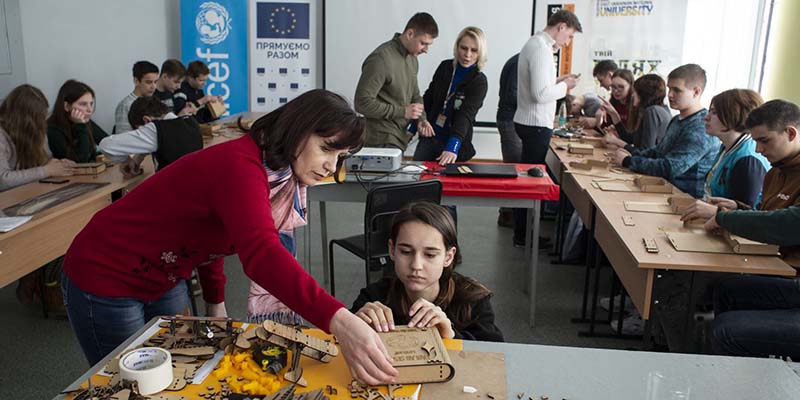3.1 Vocative Case (Feminine Nouns)

In this module, you will become familiar with the concept of the vocative case in Ukrainian and the contexts in which its forms are used. You will also learn the three vocative case endings for singular feminine nouns, and learn to distinguish between formal and informal ways of address.
Завда́ння 1
Read the dialogue below and note how the dictionary forms of the nouns ма́ма and Хри́стя change when the people are addressed directly. Note also how these vocative case forms are separated with a comma from the rest of the sentence.

ма́ма і дочка́ Хри́стя
Мама: Тут, Хри́стю.
Христя: Ма́мо, де мій гамане́ць?
Мама: Ось він, Хри́стю.
Христя: Ма́мо, де моє́ взуття́?
Мама: Хри́стю, де твоя́ голова́?!!
Complete the dialogues below paying careful attention to context and to what you have learned about the formation of vocative case thus far.
Завда́ння 2
Listen to the audio below and provide the name of the person being addressed in the nominative case (aka the dictionary form).
Transcript – Завдання 2
- Бабусю, де Марта?
- Звідки Микола, Ірино?
- Це мій брат, Олю.
- Дівчино, де твоя мама?
- Лесю, познайомся: це моя колега Марина Семотюк.
- Добрий день, колего!
Завда́ння 3
Read the dialogue below and note how the female names ending in –ія change to the vocative case when the person is being addressed directly.
А́нна: Марі́є, познайо́мся: це моя́ сусі́дка Софі́я.
Марі́я: Приві́т, Софі́є! Ду́же приє́мно. Я Марі́я.
Софі́я: Приві́т, Марі́є! Мені́ теж.
Complete the sentences below paying careful attention to context and to what you have learned about the formation of vocative case thus far.
Важли́во!
Vocative case forms are used in all forms of direct address.
Note that the formality of the situation is in part conveyed by the form of address itself. One way this is done is through the use of the first name with the patronymic (name of the father + ending –івна for women):
Софі́я Петрі́вна – Софі́є Петрі́вно!
Пані is another common formal way to address women. It can be combined with the person’s first or last name, or position.
Па́ні Софі́є!
Па́ні Грищу́к!
Па́ні дире́кторко!
Па́ні профе́сорко!
Note that the word па́ні has the same form in the nominative and the vocative cases (as do all foreign female names that don’t end in –a or –я: for ex., Ме́ґан!) The feminine nouns that follow па́ні take regular vocative case endings, with the exception of last names (hence Па́ні Грищу́к!)
In formal contexts two adjectives are commonly used: Дорога́ (‘Dear’) or Шано́вна (‘Respected’):
Дорога́ па́ні Софі́є!
Шано́вна па́ні дире́кторко!
Завда́ння 4
Judging by how these emails begin, indicate whether they are formal or informal.
Ціка́во!
Male Ukrainian names that end in –а follow the feminine pattern in case forms and will replace the ending –а with –о in vocative case.
Мико́ла (‘Nicholas’) – Мико́ло!
Лука́ (‘Luke’) – Луко́!
Яре́ма (‘Jeremy’) – Яре́мо!
Завда́ння 5
You will hear eight examples of someone being addressed directly. For each, indicate whether a man or a woman is being addressed and whether the address is formal or informal.
Transcript – Завдання 5
- Дорога сестро!
- Привіт, Яремо!
- Шановна пані Таран!
- Доброго ранку, мамо!
- Миколо!
- Дорога Євгеніє Миколаївно!
- Привіт, Луко! Як справи?
- Шановна пані викладачко!
Мо́вний пазл
Look through the activities you have just completed and choose the correct statements below to summarize what you have learned.
А тепе́р тест!
Complete the dialogues by providing the missing grammatical endings. Then answer the questions that follow.
head

